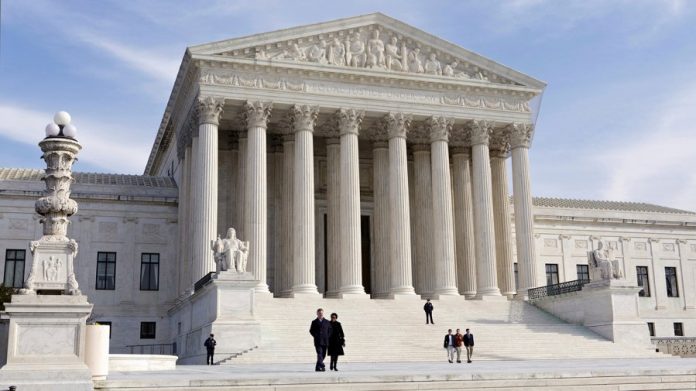
As the Supreme Court closed its latest term, it did so by denying justice to Native Americans—yet again. With its refusal to hear Apache Stronghold v. United States, the court effectively allowed a foreign-owned mining company to desecrate a sacred Apache site — Chí’chil Biłdagoteel, or Oak Flat — opening the door for it to be swallowed by a massive crater in the name of copper and profit. It’s a decision that echoes centuries of erasure, colonization, and corporate greed—and one that sends a chilling message to Indigenous Peoples across the world: that our prayers, our places, and our people remain expendable.
The tragedy here is not just what the court failed to do — but who failed to act. In a bitter twist, the court’s three liberal Justices — long seen as allies to Indigenous communities — declined to join Justices Gorsuch and Thomas in defending Native religious freedom. This was not a fringe case. It was a defining test of whether the promise of the First Amendment applies to all faiths, or only to the dominant ones.
Chí’chil Biłdagoteel is not just land. It is the spiritual heart of the Western Apache. It is where ceremonies are held, where language is spoken, and where generations have connected with the Creator. For decades, it was protected — until 2014, when mining lobbyists quietly inserted a midnight amendment into a must-pass defense bill, transferring the land to Resolution Copper, a subsidiary of two of the world’s largest mining conglomerates, Rio Tinto and BHP. Their plan: a vast mine that will collapse the sacred site into a two-mile-wide, 1,000-foot-deep pit—permanently ending Apache religious practices tied to that land.
In response, Apache Stronghold — a grassroots coalition of Apache spiritual leaders and their allies—brought suit, arguing that destroying Oak Flat would violate the Religious Freedom Restoration Act. But four years of litigation have not delivered justice. In 2024, the Ninth Circuit, in a 6-5 ruling, rejected the Apaches’ claims, saying that reducing Oak Flat to rubble doesn’t burden their religious freedom. Every judge that sided with the mining company was Republican-appointed. Every Democratic appointee dissented, calling the ruling a “tragic error.”
The Supreme Court had the chance to correct that error. Instead, it declined to act — despite clear precedent supporting religious liberty in far less consequential contexts. Just this summer, the court ruled in favor of parents who objected to gay- and transgender-affirming books in public school (Mahmoud v. Taylor), declaring that merely exposing a child to ideas contrary to a parent’s faith burdens religious freedom. Meanwhile, the court has refused to even hear a case about the destruction of a Native sacred site.
To their credit, Justices Neil Gorsuch and Clarence Thomas dissented, calling the court’s inaction a “grave mistake.” Gorsuch, who has a strong record on Indian law, rightly warned that “before allowing the government to destroy the Apaches’ sacred site, this court should at least have troubled itself to hear their case.” He’s right.
What’s more troubling is the silence of the court’s progressive wing. Justices Elena Kagan, Sonia Sotomayor, and Ketanji Brown Jackson could have joined the dissent to form a majority. They did not. Their absence is not only deeply painful — it’s strategic malpractice. If the court is already expanding religious freedom in sweeping terms, progressive justices should be using that very doctrine to protect Native peoples whose traditions predate the Constitution itself.
The Apaches have now asked the court to reconsider in light of Mahmoud. Their argument is powerful: If reading a book burdens religious freedom, then surely obliterating the cradle of an entire religion does too.
While the Supreme Court considers their case, the fight in the lower courts continues. Just this week, in two of the three related lawsuits, the Ninth Circuit temporarily blocked the government from giving Oak Flat to Resolution Copper. That ruling temporarily safeguards the sacred site and allows the various lawsuits, including Apache Stronghold’s, to continue before Oak Flat is destroyed.
But this issue is even bigger than Oak Flat. It is about whether Indigenous religions deserve equal standing in the eyes of the law. It is about whether we will continue a pattern of dispossession cloaked in bureaucracy — or rise to meet this moment with moral clarity and courage.
As a global advocate working with Indigenous nations across five continents, I see this case for what it truly is: a litmus test for the soul of the American legal system. If this country claims to uphold religious liberty, self-determination, and justice, then it must apply those principles to the First Peoples of this land — not just to the politically powerful or religiously familiar.
The court still has time to change course. The stakes are clear. The world is watching.
Fawn R. Sharp is the 23rd President of the National Congress of American Indians, former President of the Quinault Indian Nation, and serves as a Global Board Member of The Nature Conservancy and a Council Member of the World Economic Forum’s Global Future Council on Natural Capital.

